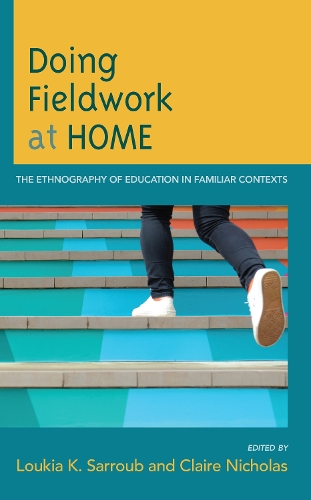
Doing Fieldwork at Home: The Ethnography of Education in Familiar Contexts
(Paperback)
Publishing Details
Doing Fieldwork at Home: The Ethnography of Education in Familiar Contexts
By (Author) Loukia K. Sarroub
Edited by Claire Nicholas
Bloomsbury Publishing PLC
Rowman & Littlefield Publishers
24th March 2021
United States
Classifications
Professional and Scholarly
Non Fiction
Curriculum planning and development
Education / Educational sciences / Pedagogy
Teaching skills and techniques
Social research and statistics
370.723
Physical Properties
Paperback
196
Width 153mm, Height 218mm, Spine 12mm
313g
Description
This book engages readers via the international contributions from home field sites around the world and international authors. Importantly, the various chapters address a wide spectrum of educational contexts ranging from higher education, to K-12 public and private schools, to prison schools. The realistic accounts portrayed in each of the chapters address how local collaborations are instantiated through the research process, from access and data collection to the write-up phases. The major themes that emerge across the chapters highlight 1) positionality and negotiation of multiple roles, i.e., researcher, educator, colleague, friend, community member; 2) reconciling multiple, hybrid, and intersectional identities with varying insider/outsider statuses vis--vis research participants; 3) resulting power dynamics in connection to relational identities sometimes conflicting, consolidating, equalizing, and/or elevating; 4) innovative methodological responses to these dilemmas; and 5) integrated research designs and research ethics, offering possibilities for participation and insights on the social impact of research findings. The books chapters thus individually and collectively treat and resolve local ways of doing home (field) work and highlight the creation and sharing of knowledge among researchers and research participants.
Reviews
his timely collection boldly engages new and fluid understandings of being in the field in home contexts. Drawing from the sustained ethnographic and theoretical work if its contributors, the book offers a critical global perspective on the enduring fieldwork tensions in education between distance and proximity (whether temporal or spatial), the role of teacher and researcher, and the complexities that arise when researchers committed to doing relational work within their own home fieldwork locations the workplace, the university, the neighborhood, or the school must document, and, at times, interrupt the very social reproduction processes in which they participate. The authors in this volume inspire ways to renegotiate the meanings of home and fieldwork, but more importantly, they also intervene in the broader disciplinary field by advancing new ways to renegotiate the meaning and purpose of ethnographic inquiry. -- Patricia Baquedano-Lpez, Associate Professor, Graduate School of Education University of California, Berkeley
Doing Fieldwork at Home tackles an enduring question: how does educational ethnography change when its done in contexts familiar to the researcher This brilliant book, edited by veteran ethnographers Claire Nicholas and Loukia Sarroub, examines questions of positionality, intersectionality, epistemology, power dynamics, and ethics in ethnographic research. The chapters illuminate how home is negotiated and strange-making is sustained over the course of the research project. This provocative book provides key insights regarding the interconnected methodological, ethical, and analytical dilemmas of doing fieldwork at home. This provocative book, which provides key insights regarding the interconnected methodological, ethical, and analytical dilemmas of doing fieldwork at home,' will be of great interest to ethnographers, education studies scholars, and students in qualitative research courses. -- Lesley Bartlett, University of Wisconsin-Madison, USA
It is past time for ethnographers to be recognized for the work they do and the contributions they make at home. This collection of chapters by ethnographers of education from around the world brings this subject to the fore, highlighting advantages and dilemmas of fieldwork at home; raising issues of positionality, collaboration, power, and methodology; and, introducing new avenues for ethnographic study and research in education and beyond. -- Margaret Eisenhart, Distinguished Professor Emerita, University of Colorado-Boulder
Where we conduct ethnographic fieldwork matters since it sets the template for the context that shapes who ethnographers interact with and what sorts of data one can and cannot access. This book helps frame what is meant by 'local contexts' and reflects on how studying the local as implications for ethnographers' methodological, analytical and ethical practices. A must read for anyone who is doing ethnography in a familiar setting. -- Lisa Russell, University of Huddersfield
Author Bio
Loukia K. Sarroub is professor of literacy studies and education & linguistics and chair of graduate programs in the Department of Teaching, Learning & Teacher Education at the University of Nebraska-Lincoln, where she also has a courtesy professor appointment in the Department of Anthropology.
Claire Nicholas is assistant professor of textiles and material culture in the Department of Textiles, Merchandising & Fashion Design at the University of Nebraska-Lincoln.
